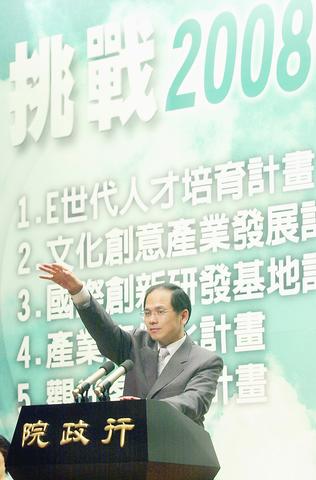Some of the nation's top business leaders yesterday voiced strong support for the Cabinet's NT$2.6 trillion six-year national development project, aimed at turning Taiwan into a "green silicon island" -- a nation devoted to clean high-tech industries.
Morris Chang (
"I'm particularly impressed with the talent cultivation plan, because it's important to build a first-rate talent pool in the era of the knowledge-based economy," he said.

PHOTO: CHIANG YING-YING, TAIPEI TIMES
Stan Shih (
"It's such a good plan that the government should consider publicizing it more," he said.
Premier Yu Shyi-kun yesterday pledged to implement the project to the full after the Cabinet approved the plan.
"I'm well aware that the goals we set down are high, but we're determined to do our best to reach them, as I have confidence in the country, the Taiwanese people and the government," Yu said.
The government hopes that implementation of the project will help create 700,000 new jobs, spur Taiwan's economy to grow from the current 2.3 percent to 5 percent, decrease the unemployment rate from the current 5 percent to 4 percent and have research and development expenses take up 3 percent of GDP.
In addition, the Cabinet hopes the project will help develop at least 15 products or technologies that will rank among the world's best, double the current number of foreign tourists from 1 million to between 2 million and 5 million and increase the household use of broadband Internet services to 6 million homes.
While Vice Premier Lin Hsin-Yi (
Hu Sheng-cheng (
Chen Chi-nan (
Lin Sheng-feng (
Tsai Ching-yen (蔡清彥) is to supervise the implementation of plans to digitize Taiwan and Kuo Yao-chi (郭瑤琪), head of the Cabinet's Public Construction Commission, will oversee the nationwide mass transportation network plan.
Likening the introduction of the project to the birth of a child, Yu said he is happy to see the project come into being after 76 rounds of discussion and revision.
"We hope that with the implementation of the project, we'll be able to upgrade Taiwan's quality of life and lessen the gap between Taiwan and other developed countries," he said.

Taiwan is stepping up plans to create self-sufficient supply chains for combat drones and increase foreign orders from the US to counter China’s numerical superiority, a defense official said on Saturday. Commenting on condition of anonymity, the official said the nation’s armed forces are in agreement with US Admiral Samuel Paparo’s assessment that Taiwan’s military must be prepared to turn the nation’s waters into a “hellscape” for the Chinese People’s Liberation Army (PLA). Paparo, the commander of the US Indo-Pacific Command, reiterated the concept during a Congressional hearing in Washington on Wednesday. He first coined the term in a security conference last

Prosecutors today declined to say who was questioned regarding alleged forgery on petitions to recall Democratic Progressive Party (DPP) legislators, after Chinese-language media earlier reported that members of the Chinese Nationalist Party (KMT) Youth League were brought in for questioning. The Ministry of Justice Investigation Bureau confirmed that two people had been questioned, but did not disclose any further information about the ongoing investigation. KMT Youth League members Lee Hsiao-liang (李孝亮) and Liu Szu-yin (劉思吟) — who are leading the effort to recall DPP caucus chief executive Rosalia Wu (吳思瑤) and Legislator Wu Pei-yi (吳沛憶) — both posted on Facebook saying: “I

Sung Chien-liang (宋建樑), who led efforts to recall Democratic Progressive Party (DPP) Legislator Lee Kun-cheng (李坤城), was released on bail of NT$80,000 today amid outcry over his decision to wear a Nazi armband to questioning the night before. Sung arrived at the New Taipei District Prosecutors’ Office for questioning in a recall petition forgery case last night wearing a red armband bearing a swastika, carrying a copy of Adolf Hitler’s Mein Kampf and giving a Nazi salute. Sung left the building at 1:15am without the armband and covering the book with his coat. Lee said today that this is a serious

A mountain blaze that broke out yesterday morning in Yangmingshan National Park was put out after five hours, following multi agency efforts involving dozens of fire trucks and helicopter water drops. The fire might have been sparked by an air quality sensor operated by the National Center for High-Performance Computing, one of the national-level laboratories under the National Applied Research Laboratories, Yangmingshan National Park Headquarters said. The Taipei City Fire Department said the fire, which broke out at about 11am yesterday near the mountainous Xiaoyoukeng (小油坑) Recreation Area was extinguished at 4:32pm. It had initially dispatched 72 personnel in four command vehicles, 16